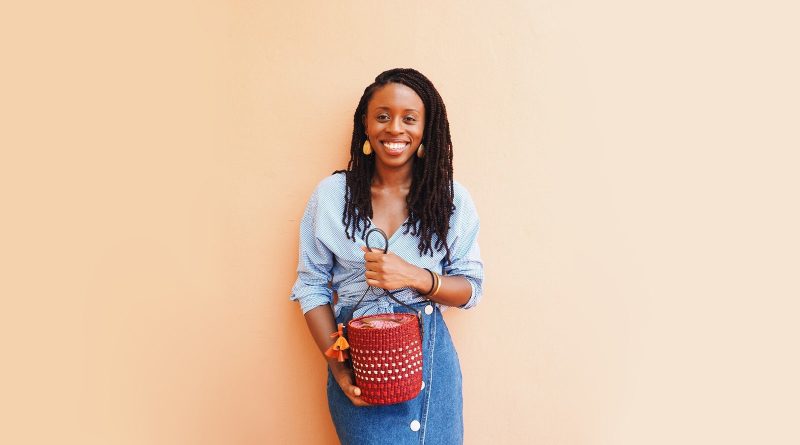Handbag Designer Akosua Afriyie-Kumi on Finding Inspiration in Ghana: Women Who Travel Podcast
You can listen to the Women Who Travel podcast on Apple Podcasts and Spotify each week. Follow this link if you’re listening on Apple News.
If you’re sick and tired of winter like we are, sit down, breathe in, and picture yourself in sunny southern Ghana, where temperatures are currently a balmy 80 degrees and maximalist colors and patterns abound. That’s where this week’s guest, Akosua Afriyie-Kumi, is calling in from—and where she gets her design inspiration for her woven handbag brand AAKS.
We’ve been long obsessed with the brand, which uses woven rafia to create crossbody bags, totes, and baskets in joyful colors—and has recently branched out into home decor. We sat down with Akosua to talk about how travel, both in Ghana and internationally, has inspired her designs, how she’s stayed creative amid the pandemic, and how she navigated the sales boom that came in the aftermath of George Floyd’s murder and the Black Lives Matter resurgence last summer.
Thanks to Akosua for joining us and thanks, as always, to Brett Fuchs for engineering and mixing this episode. As a reminder, you can listen to new episodes of Women Who Travel on Apple Podcasts, Spotify, or wherever you listen to podcasts, every Wednesday.
Read a full transcription of the episode below.
Meredith Carey: Hi, and welcome to a new episode of Women Who Travel, a podcast from Condé Nast Traveler. I’m Meredith Carey, and with me, as always, is my co-host Lale Arikoglu.
Lale Arikoglu: Hello.
MC: Here at Traveler, we’ve long been obsessed with the Ghanaian-brand, AAKS, which uses women’s weaving techniques often passed down through generations to make ultra-colorful and sustainably-produced handbags. Today, we’re joined by the brand’s founder and designer, Akosua Afriyie-Kumi, calling in from Kumasi, Ghana. Thank you so much for joining us.
Akosua Afriyie-Kumi: Yeah. Thank you.
LA: So, to get started, I just want to ask a very simple question—but also I think one that probably has many answers to it—which is, what is life like in Ghana right now?
AAK: Yeah. Life, it’s really simple in Ghana. The sun is constantly shining. I couldn’t be happier to be here, because my mom is actually stuck in the U.K. in the lockdown, and it’s snowing and she’s constantly complaining about how she can’t wait to come back. So yeah, Ghana, the life here is super, super simple. With the whole pandemic, everything has changed a little, in terms of, we are not going out as much, there’s a lot of restrictions—slight restrictions, not as in other countries around the world—but I love being here. This is where my family lives, this is my home, so I’ve always been really drawn to live in somewhere that the sun is constantly shining. I guess that’s where I get all my inspiration from. And yeah, I would say life is good here, I’m happy.
MC: I am sitting in my window, staring at the snow, trying to get as much sunlight on my face as possible, so, I am very jealous of the near-constant sunshine that you are experiencing. But to rewind back to the beginning, I’d love to know how AAKS got its start, or even to go back further, how you got into design in the first place.
AAK: Yeah. So, of course, I lived in Ghana when I was growing up; beautiful country, lots of nature, lots of color, so that has always been something that has been at the back of my mind when growing up. I’ve always had the love for arts. I went to school and specifically did visual arts because I loved to draw when I was really young. And I guess my parents saw this talent, I would say, in me. And at the time, when I was growing up in Ghana, art wasn’t valued, so there were a lot of times where I would go to school and people would ask me, because, it was a school that had, of course, other people doing other courses as well. And I would tell them I’m doing visual arts, that’s what it was called at the time, and everybody would be like, “What?” Basically, it was a course that nobody wanted to do, and that’s what I wanted to do.
So, through a lot of encouragement from my family, they knew that this is what I was inspired by. And at the time, when I finished school, my sister was in the U.K., so my parents thought it would be perfect for me to go to a country or a place or a university that really appreciated my sense of design or my flair for fashion, I would say. So, that’s how it all happened. I left Ghana when I was 18 when I graduated, and then I went to study in the UK. And, of course, I wanted to do graphic design, but then I fell into fashion because I loved the idea of clothing. So, after graduating, it was, “What to do?” I did a lot of internships. And I come from a family of entrepreneurs, so my mom and my dad both owned their own businesses, so, it’s not uncommon for any of my sisters or my brothers to say, “Oh, we are going to start our own business.” It’s just something that I’ve grown up with.
So, I remember when I was in the U.K. trying to find a job, and my mom visited and she said, “Why don’t you come to Ghana and start this thing that you’re always talking about?” But at the time, I didn’t have anything solid in hand that, “Oh, I’m going to Ghana to do this and that.” I started doing a bit of research, and she said, “Just try, come back to Ghana. If it doesn’t work, at least you tried.” So I was like, “Okay, at least I tried. Okay, let me go back to Ghana and see where it takes me.” And that’s how the journey all began. And I literally packed my bags in less than a week, and I came back to Ghana with my mom after being in the U.K. for eight years. So, yeah, she was really the biggest push for me to realize I need to do something, and not rely on finding a job, but actually, I could create something.
So, I came back to Ghana, spent a year traveling around the whole country, trying to make my ideas come to life. At the time, I was torn between doing accessories or doing fashion clothing, because, my background was in closing, but I knew I wanted to go out and do something unique, something that I haven’t seen before, but I remember, of course, being inspired by beachwear or beach clothing, and being inspired by the sun here in Ghana. So, when I returned, it just happened. Yeah. And all the color and everything around. I mean, on Sundays, all the women are in their colorful clothing, and I couldn’t have imagined starting my brand living in the U.K., where I open my windows and it’s gray outside.
But here, I open my window, and the sun is out, so it’s like, “Okay, let’s put yellow, let’s put blue.” So, it really, really inspires me to go crazy with my ideas and not think of a product that could maybe only work in a certain country, but let’s see what happens; I’m sure there are color lovers around the world. So, this was my idea. And then I launched my first collection, and it happened really quickly.
MC: You were talking about how when you were starting out in middle school and high school, that creativity in that way, wasn’t valued in the way that maybe you see it now. Can you talk a little bit about any shift that you’ve seen in the appreciation or interest in makers and artists and creatives in Ghana?
AAK: Yeah, absolutely. So, at the time, art wasn’t appreciated. Everybody wanted to be either a doctor or a pharmacist or an engineer, these were the top roles. And I wanted to be a designer, so, it wasn’t really heard of, but now, there’s been such a change and movement. There’s been a huge change in the appreciation for design. And I see so many people starting their own brands and it’s been such a huge shift in maybe the last five to six years where everything has really, really moved on. Now, it’s like it’s actually cool to be an artist, whereas before, it wasn’t something that people were hoping to do when they grow up. But there’s a lot of support around the world for designers or African design at the moment, and this has really propelled everything to another stage. And I’m so happy to be part of that movement, currently here in Africa, or Ghana specifically.
LA: You sort of were talking about how there wasn’t as much of an appreciation for design and the visual arts, but there’s also a huge history of craftsmanship, and your brand draws on that history of craftsmanship and weaving techniques that have been passed down through generations. Was it always your intention to draw on those processes, or was it a sort of organic thing that made sense as you started to explore your own country more?
AAK: Yeah, so, I wouldn’t say it was a conscious decision, but when I was doing my research before I came back to Ghana, I knew I wanted to create something completely different. So, when I arrived, is when I saw all these amazing handmade processes here in Ghana, which there was no spotlight on this around the world. So, I was really intrigued in this aspect of, maybe, basketry or craftsmanship, which was happening here in Ghana. And I thought I could gear my way towards this idea, or I would say, towards this concept, but it was very, very organic.
I started with three women under a tree, and I worked under a tree for probably a couple of years. I didn’t have a studio, so every time I used to travel to the North, it was me and my three women under a tree. And then it grew into 10 women, 20 women, 30 women. So, I loved that aspect of it because all the women that I work with actually have children or they are out of school, and it’s changing that conversation around using weaving as a natural source of income or something that can be sustained for a very long time, because, weaving, most of the artisans, they grow up with parents who are weavers, you are a weaver, your brother is a weaver, your granddad is a weaver. It’s really generations on generations. So, the skillset, it’s not something the women are thinking, “Oh, this is so special.” But that’s where I come in and I show them where my brand has gone with their skill sets, and they’re so blown away, thinking, “Wow, I did this.”
So, a lot of changes are happening in terms of people understanding weaving as an actual art. And working with the women, it’s so special because I get to know about their lives, their children, and I feel really part of their families as well, and to help women. Even in my finishing team, I only have one male. Everyone, it’s all female. And I love that. It’s something that I guess… Yeah. I have a lot of sisters, I have three sisters and I have only one brother, and he’s the youngest. So, my house is just full of women. It’s just my dad and my brother, and that’s it, and it’s just women everywhere. So, yeah, I guess it’s always on my mind to work with women and to see where that goes. Yeah.
MC: Sustainability and really trying to create an ethical brand are behind a lot of the ethos of what you put out into the world, on social media, and in the story of your bags. What has creating those ethical values been like, and what has implementing them in how you produce and sell your bags looked like as well?
AAK: Yeah. So, creating them has been, honestly, not something that, maybe, I go out and say, “Yes, I’m going to be an ethical brand.” It’s part of my life, it’s part of living in Africa, where these are some of the methods of production that we use here, which just are absolutely beautiful. So, of course, I wouldn’t want to produce thousands and thousands of my bags, so all of my products are made by hand. And when I say made by hand, it’s really, really made by hand. The entire process is actually made by hand, and I would love to do a video around that to show, from sourcing of the raw materials to the twisting, to the dyeing, to the actual weaving, and then the bags being transported to Kumasi where I am, and us doing all the finishing and packaging and everything, till it gets to the customer. It’s truly, truly, truly made by hand, and that’s something so special that I would love to continue that conversation along the way.
LA: So, you mentioned earlier, how, when you first got back to Ghana from the U.K., you started traveling around and researching and formulating the idea for the brand. As your designs have continued to evolve, and I assume you’ve kept traveling, both in Ghana and internationally, how has that continued to shape your vision and influence you? How important has travel been as an inspiration?
AAK: Through my brand, I’ve been able to travel to so many places, and it’s so nice when I travel to maybe Paris, or Milan, or Cape Town, or even Accra. I literally just sit back and I imagine all the women passing by, them holding my bags, and the looks that they have, will that work, will that not work. So, I think travel has really impacted my designs because, when I started, it was more about what I loved, and now, it’s about what the customer loves, what I love, and putting that together as a brand. And yeah, I’m so happy that I’m able to do that.
MC: Are there any places that you’ve been that, as soon as you’ve landed, you’ve been like, “Oh my gosh, I’m going to come back home with so much to work on because I’ve seen so much”?
AAK: Cape Town was amazing. I couldn’t believe I was still in Africa. I’ve been to Morocco, which I absolutely love because the craziness of the souks is just like being in Ghana and Kumasi in Kejetia in the markets, and that’s so special. And I love being in, of course, other countries such as France or Italy or Belgium, it’s just a position of different ideas and what that could work here, what that could work in another country or a continent like Europe or the U.S. or Canada, and just putting all those ideas together. So, I think it really, really, really helps me to stay more inspired and also to stay on trend and to see what customers love and how far I can push that.
LA: Sort of just to stay on this topic for a little bit longer, I loved what you were saying about when you see all these women walking by and you imagine your bags on them and how they would wear them, and how it worked then. What are some of the cities, both throughout Africa and abroad, that you think has really great style, that you see the people walking down the street and you’re just captivated by their style?
AAK: Yeah. I would say Kenya, of course, Accra in Ghana, Nigeria, Paris. Milan was crazy. I went during fashion week, and it was so cool to see all these girls and the women and men so beautifully dressed, and it was such an inspiration to see that and to envision, “Okay, my bag would fit perfectly on this girl just walking down that street.” And it’s really inspirational. I really enjoyed it.
MC: The last year has obviously meant that a lot of us have been staying a lot closer to home, and most of us haven’t been able to travel very freely in the last year. With travel inspiring you and seeing other people’s style inspiring you, how have you been able to stay creative while you’ve been a little less moving around? That’s not proper grammar, but we’re going to go with it.
AAK: Yeah. So, the pandemic has been extremely strange for me and my brand, or for Black-owned businesses around the world. In June, everything changed, where there were so many people around the world sharing Black-owned businesses due to a tragic incident in the US which became almost a positive in the end, where a lot of Black-owned businesses were being highlighted on various platforms around the world. And through that, my sales skyrocketed, literally through the roof. I was running around the whole of the place, the whole of Ghana, trying to put things together and to actually fulfill all the orders that I’ve gotten. So, of course, the pandemic has stopped me from traveling, but it’s also really helped me to slow down at the same time, and to really appreciate the little things in life. A lot of families have come together, a lot of people have realized that it’s just time to slow down. And with my brand, everything, it’s very slow. So, in terms of my practices or my ways of life in Ghana, not much has changed for me.
I remember going to London after I moved back to Ghana, and I stood at Victoria Station, I was like, “Oh my God.” Everybody was just running around, and I had been here for maybe two years and I haven’t been back. And I couldn’t believe I was part of that rat race. And I feel the pandemic will make everyone really appreciate the little things to go back to basics. And also, there’s been a movement around supporting local brands or local communities or local companies, and this is so nice because then we are able to connect directly with customers who want to buy something from a smaller brand instead of a bigger brand. So, it’s worked in a both positive and negative ways, but I feel it’s going to make everyone take a step back and rethink where you want to go in life, what you really want to do. And I’m so happy to be here to experience this, even though everyone is stuck at home. I feel it could potentially be a way for people to refocus, rethink.
MC: There’s been a lot of conversation in the U.S. specifically, about that influx of sales that you saw over the summer, and how great that was, but how much stress it put on a lot of small businesses. You were saying you were running around trying to find the materials. What was that time like for you, seeing your sales increase so much and then having to meet that expectation unexpectedly?
AAK: Yeah. So, I think it all started on the 2nd of June when I woke up, and my online store had over a hundred sales. I thought, “What’s going on?” Obviously, I knew everything that was happening in the US. I was trying to rethink how the connection was, and it was really stressful, because, it was in March, April, that all the countries were going on lockdown, and if you haven’t restocked on your materials or anything, but in terms of the conversation around the world, it was like everything was coming to an end. So, I feel a lot of small businesses didn’t have any backup. We just sat back, thinking, “Okay, we are probably not going to do this for a long time, but we’ll see where things are going,” and then suddenly, boom, all of these sales.
And honestly, I was excited and fearful at the same time, because a lot of customers around the world are so used to everything being super, super fast. You order something on Amazon, and it’s 24, I don’t know, maybe four hours, and you’ll receive it in the US. And here in Ghana, everything is super slow. So, to me, I’m still living that slow lifestyle, so I was quite worried that customers might not be happy in terms of delivery times and making processes, but everybody was so nice. And I guess as I was saying previously, it’s just the time for everyone to really slow down and to rethink. So, everybody was extremely happy to wait, and they gave us enough time to do production. And so, I had a lucky escape, but it was busy. I was running around like a crazy chicken, but it was busy but good, good-busy.
LA: You must have had real conflicting feelings to be experiencing success and such excitement during a time that also was very difficult and was, like you said earlier, born out of something terrible.
AAK: It was. It made me feel I couldn’t celebrate. I felt, do I share this on social media? Do I tell my followers that this is what’s happening, or do I keep it to myself and just fulfill the orders, and maybe the conversation would change eventually? But it was tough to know where I sit as a brand, but then, the great thing that happened was there was a lot of positive things that came out of what happened, and I feel a lot of new voices were being heard, and I was happy to be part of that and to really write thoughtful messages to customers, to people around the world, thoughtful posts on social media to really connect with a new kind of customer who probably, before that, wouldn’t have connected with me. So yeah, something positive came out of it. So it was good.
MC: Obviously, last year was a wild year. What does 2021 look like for you and the brand?
AAK: Yeah. So, during the pandemic, we actually launched our home decor products, just really simple baskets, which are doing so well. So, 2021, it’s to expand on our home decor side of the business and also to launch my new collection, which is super delayed, but we are still working. And I have tons and tons of new stores on board, really big stores that I always wanted to sell to. So, I’m happy that 2021 is going to be that year that I’m going to expand as a business, even through it all. Yeah. To expand and to grow as an emerging brand from Africa, and to connect with many people around the world. So, I’m so excited.
MC: And if you have not seen the lamps that Akosua and AAKS does, the lampshades are so stunning, and we will link her site and her social in the show notes. So where can people find you and your bags online?
AAK: Yeah. So, you can visit my website, which is aaksonline.com, or connect with me on Instagram. I’m always on it. And it’s @a.a.k.s. Just that. When you search for it, it’ll come up really easy.
MC: Amazing. I’m @ohheytheremere.
LA: And I’m @lalehannah.
MC: Be sure to check out; there’s amazing handbags and baskets and lampshades online. Follow Women Who Travel on Instagram @womenwhotravel. Join our Facebook group and subscribe to our newsletter, and we will talk to you next week.
Source: Read Full Article



